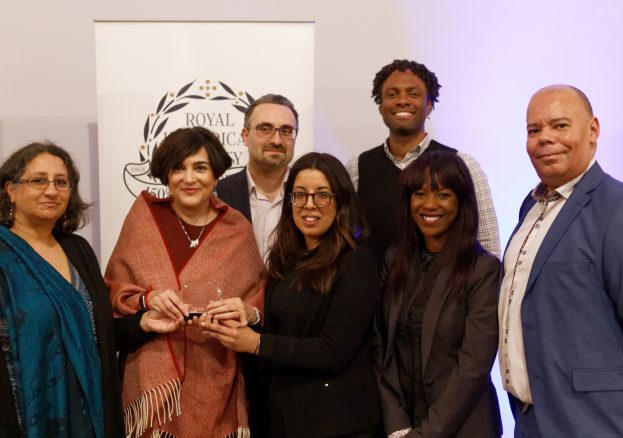
The high calibre of UK contributions to historical research in these areas was conspicuous at the Public History Prize award ceremony sponsored by the Royal Historical Society (RHS) in January 2018.
Projects that illuminate Black and Minority Ethnic (BME) histories won three of the five categories. David Olusoga’s Black and British: A Forgotten History (BBC2) won the TV & Film category; the Runnymede Trust’s Our Migration Story: The Making of Britain won the Online Resources category; and Partition Voices, presented on Radio 4 by Kavita Puri, won both the Radio & Podcast category and the overall Public History prize.
In sharp contrast to this vibrant backdrop of increasing diversity in public history, the racial and ethnic profile of students and staff in UK university History departments remains overwhelmingly White. Both the experience and attainment of BME students and staff in UK History persistently lag behind those of White peers. The taught curriculum for secondary school pupils and university students often fails to incorporate the new, diverse histories produced by UK and international academic and community-based researchers. These problems within university History have distinct origins and pathways. But they are also intertwined. Individually and cumulatively, they diminish the quality of teaching, learning and research in History in the UK. Addressing and rectifying these systemic problems is essential if schools and universities are to fulfil their mission of fostering excellence. More broadly, these changes are vital to enhance public understandings of the past in Britain.
The Royal Historical Society is committed to working for equality, diversity and inclusion in the practice and study of History. Its Race, Ethnicity & Equality Working Group has been meeting regularly since 2017. The Society is launching a report entitled Race, Ethnicity & Equality in UK History: A Report & Resource for Change on the 18th of October 2018.
This report identifies major obstacles to racial and ethnic diversity and inclusion in UK university History, tracing underrepresentation from secondary-school level through undergraduate study, postgraduate training and postdoctoral employment. It documents substantial levels of bias and discrimination experience by historians in UK universities, and recommends pragmatic steps to enhance the representation and experience of BME students and staff. The limited attention paid to race and ethnicity in UK History curriculums, it argues, is also a key barrier to the inclusion and achievement of BME students and staff in History departments. Key findings of the report include:
- Students who study history at university are overwhelmingly White, and this BME under-representation increases further at postgraduate (MA and PhD) level;
- History academic staff are even less diverse than History students: less than 5% of university historians are BME and many History departments have no Black academics;
- 32.6% of BME historians who responded to the RHS survey had witnessed discrimination or abuse based on race or ethnicity in their university workplaces;
- Efforts to diversify the History curriculum are widespread in UK universities, providing new opportunities for change: 86.3% of respondents reported that their department had recently sought to widen the curriculum beyond Britain and Europe.
The RHS report offers practical recommendations for change to university staff, as well as guidance for secondary school and university teachers on accessing additional information, resources and support. A generous donation from the Past & Present Society will fund a 2-year postdoctoral Research Fellow to work with the RHS to improve BME equality and inclusion in History in schools and universities in 2019-2020.
Pioneering efforts by many individuals and groups have inspired this RHS initiative. The Black and Asian Studies network; the History Matters group and annual conference led by Professor Hakim Adi of the University of Chichester; the Runnymede Trust’s diverse portfolio of projects on race equality; and the interventions of the professionals who belong to Museum Detox—to name just a few—have created fertile ground for future transformation. If, together, we can get this right—diversifying both the content and the personnel of History in UK schools and universities—the study of the past in and beyond Britain will be enriched and strengthened. The impressive, dynamic portfolio of activities, speakers and performances showcased each October in Black History Month provides an essential reminder of why this matters so much for 21st-century Britain.
